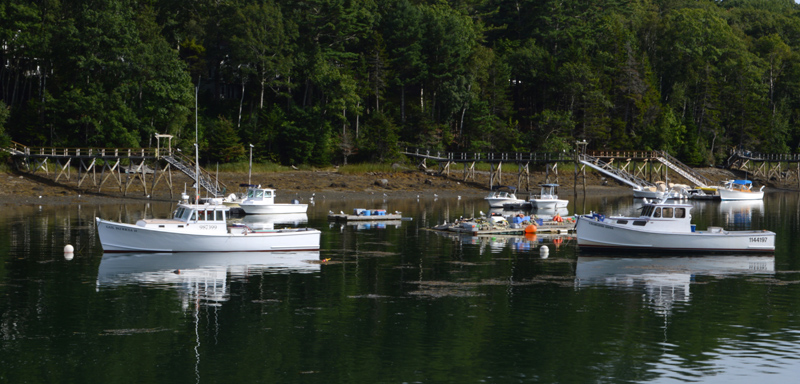
Lobster boats at their moorings near the South Bristol Fishermen’s Co-op in 2019. (LCN file photo)
Rep. Holly Stover of Boothbay presented a bill to set aside $30 million to help mitigate the financial impact of right whale regulations on lobstermen, during a public hearing on Feb. 1.
At the beginning of 2021, the National Marine Fisheries Service, under the National Oceanic and Atmospheric Administration, released a plan to reduce the lobster industry’s risk to North Atlantic Right Whales by 60% in 2022 and by 98% by 2031. Among other restrictions, the rules set out in the plan demand that lobstermen purchase costly new gear.
“The loss of earnings experienced by people in the fixed-gear industry due to the new restrictions are notable and if left unaddressed, can have a demonstrable impact on individuals and families across the state. We need to create some level of certainty and relief for the people who work and support our coastal communities,” Stover said in her Feb. 1 testimony.
The bill, co-sponsored by Chloe Maxmin of Nobleboro, Lydia Crafts of Newcastle, Janice Dodge of Belfast, Allison Hepler of Woolwich, Ann Matlack of St. George, Genevieve McDonald of Stonington, Sarah Pebworth of Blue Hill, and Marianne Moore of Washington, stipulates that the Department of Marine Resource would be responsible for distributing the funds.
North Atlantic Right Whales number less than 340 and are vulnerable to entanglement and ship strikes, but those opposed the rules point out that there has been no record of a right whale becoming entangled in fishing gear off of Maine’s coast since 2004, and that whale survived the incident.
Included in the NMFS plan is the seasonal closure of 967-square-miles in lobster management area 1 to fixed gear fishing with traditional buoy lines from Oct. 1 to Jan. 31. Area 1 is off the coast of Maine in Zones C/D/E. Zone D runs from Cape Rosier in Brooksville to New Harbor and Zone E runs from Pemaquid Point to Small Point in Phippsburg.
Lobstermen will also be held to new “trawling-up” standards, meaning that lobstermen must attach more traps to single buoy lines the farther out to sea they set their traps, which can demand more space on a vessel.
The plan calls for lobstermen to secure and transition to gear, such as sleeves or plastic links, or weaker ropes to use for buoy lines so that they break under the weight of a whale by the May 1 deadline. However, a problem that many lobstermen have found is that supplies on approved sleeves, plastic links, and thinner rope are extremely limited.
On Feb. 7, Gov. Janet Mills, along with Maine’s federal representatives, sent a letter to Commerce Secretary Gina Raimondo to request that the May 1 deadline be pushed back to July 1 to give lobstermen more time to seek out the extremely limited supplies of compliant gear.
Troy Plummer, a Boothbay lobster fisherman on the Zone E Council and member of the Maine Lobstermen’s Association’s Board of Directors, said that while he appreciates Stover’s efforts to put together a bill to help reduce the burden of the new regulations on lobstermen, the funds would be better spent on supporting efforts to fight the regulations altogether.
“Supporting the Maine Lobstermen’s Association legal defense fund and our lawsuit against the federal regulatory plan is all we can do,” he said in an email on Feb. 8. “I appreciate Rep. Stover’s efforts… but a real defense of our industry would be more valuable than money to help adopt these unjust regulations.”
During the Zone D Council Meeting on Feb. 8, council member Douglas McLennan of South Thomaston said that he was concerned that once Maine’s lobstermen spend the money to bring their gear into compliance, NMFS will issue new gear restrictions that will demand lobstermen to dig even deeper into their pockets.
“We’re just going to do all this and in another year they’re going to say we got to do it all over again. We’re going to be out of business anyway with a 98% reduction. That’s what I keep thinking,” McLennan said.
Department of Marine Resources Commissioner Patrick Keliher expressed feelings similar to Plummer’s during his testimony in favor of Stover’s bill on Feb. 1, adding that he was concerned by the idea of subsequent restrictions on the lobster industry to reduce risk to whales by 98%.
“It is important to ensure we are able to carry out the scientific and legal work that will be needed if we are to have any hope of mitigating future impacts. For example, if we provide money for direct assistance, but do nothing to support the State’s legal efforts, we will be putting a band-aid on a fatal wound,” Keliher said.
During the Feb. 8 Zone D meeting, DMR Deputy Commissioner Meredith Mendelson updated local lobstermen on the various court battles at the state and federal level that the state is fighting to slow and combat the implementation of the right whale rules.
In one key case, should a lawsuit requesting that NOAA’s biological opinion, upon which the whale rules are built, be vacated, then the lobster fishery could not legally operate under state authority.
“In the long run they will not stop demanding more and more… if this is allowed to go forward there will not be a traditional lobster industry as it exists today,” Plummer said.
The Marine Resources committee began to discuss Stover’s bill at length and tabled its vote to send it to the legislature during a session on Feb. 8. Discussions will continue next week.






